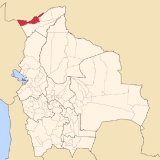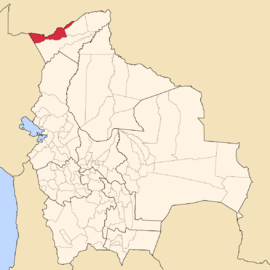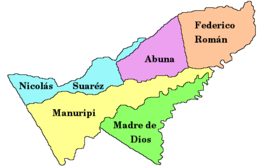
Nicolás Suárez Province
Encyclopedia
| Location in Bolivia | |
|---|---|
 |
|
| General Data | |
| Capital | Cobija Cobija The Bolivian city of Cobija is located about 600 km north of La Paz in the Amazon Basin on the border of Brazil and Peru. Cobija lies on banks of the Rio Acre across from the Brazilian city Brasiléia. Cobija lies at an elevation of ca... |
| Area Area Area is a quantity that expresses the extent of a two-dimensional surface or shape in the plane. Area can be understood as the amount of material with a given thickness that would be necessary to fashion a model of the shape, or the amount of paint necessary to cover the surface with a single coat... |
9,819 km² |
| Population Population A population is all the organisms that both belong to the same group or species and live in the same geographical area. The area that is used to define a sexual population is such that inter-breeding is possible between any pair within the area and more probable than cross-breeding with individuals... |
29,536 (2001) |
| Density Density The mass density or density of a material is defined as its mass per unit volume. The symbol most often used for density is ρ . In some cases , density is also defined as its weight per unit volume; although, this quantity is more properly called specific weight... |
3.0 inhabitants/km² (2001) |
| ISO 3166-2 ISO 3166-2 ISO 3166-2 is part of the ISO 3166 standard published by the International Organization for Standardization , and defines codes for the names of the principal subdivisions of all countries coded in ISO 3166-1... |
BO.PA.NS |
| Pando Department | |
 |
|
Nicolás Suárez is one of the five provinces of the Bolivia
Bolivia
Bolivia officially known as Plurinational State of Bolivia , is a landlocked country in central South America. It is the poorest country in South America...
n Pando
Pando Department
Pando is a department of Bolivia, with an area of , adjoining the border with Brazil. Pando has a population 66,689 . Its capital is the city of Cobija....
department
Departments of Bolivia
Bolivia is divided into nine departments . Each of the departments is subdivided into provinces , which are further subdivided into municipalities ....
and is situated in the department's northwestern parts. Its name honors Nicolás Suárez Callaú
Nicolás Suárez Callaú
Nicolás Suárez Callaú set up a multinational rubber empire in South America at the beginning of the 20th century....
(1861-1940) who owned major parts of today's Pando and Beni
Beni Department
Beni, sometimes El Beni, is a northeastern department of Bolivia, in the lowlands region of the country. It is the second largest department in the country , covering 213,564 square kilometers , and it was created by supreme decree on November 18, 1842 during the administration of General José...
Departments in the times of the caoutchouc-boom.
Location
Nicolás Suárez Province is located between 10° 39' and 11° 27' SouthLatitude
In geography, the latitude of a location on the Earth is the angular distance of that location south or north of the Equator. The latitude is an angle, and is usually measured in degrees . The equator has a latitude of 0°, the North pole has a latitude of 90° north , and the South pole has a...
and between 67° 33' and 69° 34' West
Longitude
Longitude is a geographic coordinate that specifies the east-west position of a point on the Earth's surface. It is an angular measurement, usually expressed in degrees, minutes and seconds, and denoted by the Greek letter lambda ....
. It extends over a length of 370 km from Northeast to Southwest, and up to 100 km from North to South.
The province is situated in the Amazon
Amazon Rainforest
The Amazon Rainforest , also known in English as Amazonia or the Amazon Jungle, is a moist broadleaf forest that covers most of the Amazon Basin of South America...
lowlands of Bolivia and borders Brazil
Brazil
Brazil , officially the Federative Republic of Brazil , is the largest country in South America. It is the world's fifth largest country, both by geographical area and by population with over 192 million people...
in the North, Peru
Peru
Peru , officially the Republic of Peru , is a country in western South America. It is bordered on the north by Ecuador and Colombia, on the east by Brazil, on the southeast by Bolivia, on the south by Chile, and on the west by the Pacific Ocean....
in the West, Manuripi Province
Manuripi Province
Manuripi is one of the five provinces of Pando Department in Bolivia and is situated in the department's north-western parts. Its name derives from Manuripi River which passes the province from West to East- Location :...
in the South, and Abuná Province
Abuná Province
Abuná is one of the five provinces of the Bolivian department of Pando and is situated in the department's northern central parts. It has its name from Río Abuná, the border river to neighbouring Brazil.- Location :...
in the East.
Population
The population of Nicolás Suárez Province has increased by almost 200 % over the recent two decades:- 1992: 18,447 inhabitants (censusCensusA census is the procedure of systematically acquiring and recording information about the members of a given population. It is a regularly occurring and official count of a particular population. The term is used mostly in connection with national population and housing censuses; other common...
) - 2001: 29,536 inhabitants (censusCensusA census is the procedure of systematically acquiring and recording information about the members of a given population. It is a regularly occurring and official count of a particular population. The term is used mostly in connection with national population and housing censuses; other common...
) - 2005: 39,577 inhabitants (est.)
- 2010: 51,377 inhabitants (est.)
42.4 % of the population are younger than 15 years old. (1992)
84.7 % of the population speak Spanish
Spanish language
Spanish , also known as Castilian , is a Romance language in the Ibero-Romance group that evolved from several languages and dialects in central-northern Iberia around the 9th century and gradually spread with the expansion of the Kingdom of Castile into central and southern Iberia during the...
, 4.9 % speak Quechua, and 3.1 % speak Aymara
Aymara language
Aymara is an Aymaran language spoken by the Aymara people of the Andes. It is one of only a handful of Native American languages with over three million speakers. Aymara, along with Quechua and Spanish, is an official language of Peru and Bolivia...
(1992).
The literacy rate
Literacy
Literacy has traditionally been described as the ability to read for knowledge, write coherently and think critically about printed material.Literacy represents the lifelong, intellectual process of gaining meaning from print...
of the province's population is 78.1 %. (1992)
51.9 % of the population have no access to electricity, 33.0 % have no sanitary facilities. (1992)
83.9 % of the population are Catholics, 13.8 % are Protestants. (1992)
Division
The province comprises four municipalitiesMunicipalities of Bolivia
Municipalities in Bolivia are administrative divisions of the entire national territory governed by local elections. Municipalities are the third level of administrative divisions, below departments and provinces. Some of the provinces consist of only one municipality...
:
- Bella Flor Municipality - 2,305 inhabitants (2001)
- Bolpebra Municipality - 1,194 inhabitants
- Cobija Municipality - 22,324 inhabitants
- Porvenir MunicipalityPorvenir MunicipalityPorvenir Municipality is a municipal section of the Nicolás Suárez Province in the Pando Department, Bolivia. Its seat is Porvenir. It was the site of the Porvenir Massacre on September 11, 2008. It is also the birthplace of current Cobija mayor, Ana Lucía Reis....
- 3,713 inhabitants

